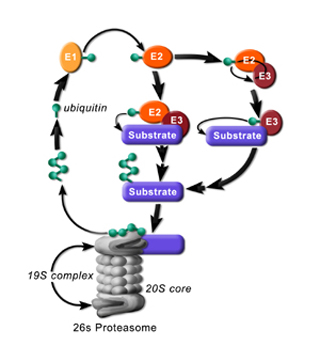
Ubiquitin is a small 76 amino-acid protein which is evolutionarily highly conserved in eukaryotic cells. Ubiquitination of proteasomal substrate proteins is performed by a complex system consisting of ubiquitin activating (E1) enzymes, ubiquitin-conjugating (E2) enzymes and substrate recognition proteins (E3 enzymes). (Image by MIT OCW. After W. Hilt, Universitat Stuttgart.)
Instructor(s)
Dr. Marta Rubio
MIT Course Number
7.340
As Taught In
Fall 2004
Level
Undergraduate
Course Description
Course Features
Course Description
This course is one of many Advanced Undergraduate Seminars offered by the Biology Department at MIT. These seminars are tailored for students with an interest in using primary research literature to discuss and learn about current biological research in a highly interactive setting.
This seminar provides a deeper understanding of the post-translational mechanisms evolved by eukaryotic cells to target proteins for degradation. Students learn how proteins are recognized and degraded by specific machinery (the proteasome) through their previous tagging with another small protein, ubiquitin. Additional topics include principles of ubiquitin-proteasome function, its control of the most important cellular pathways, and the implication of this system in different human diseases. Finally, speculation on the novel techniques that arose from an increased knowledge of the ubiquitin-proteosome system and current applications in the design of new pharmacological agents to battle disease is also covered.


